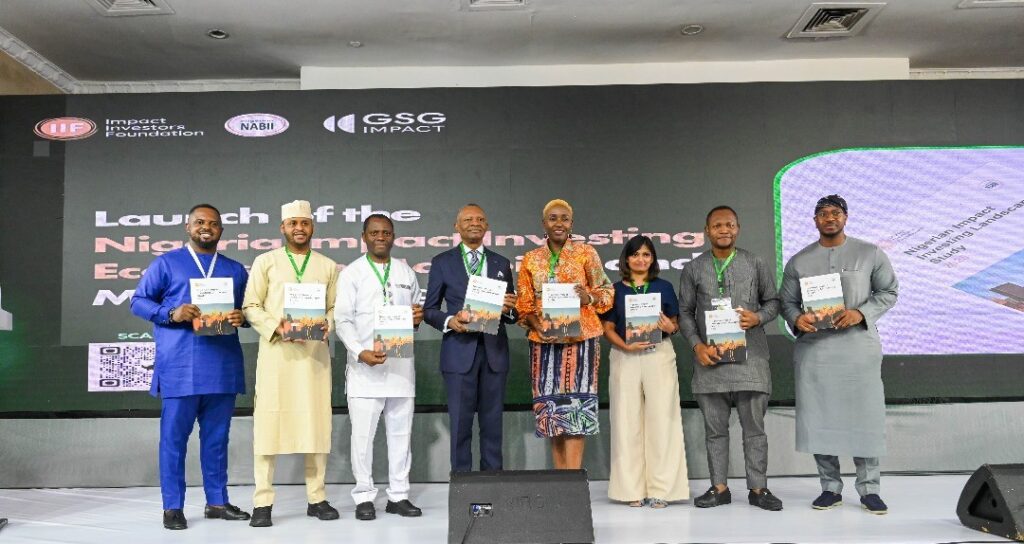Launch of the 2025 Nigeria Impact Investing Ecosystem Mapping and Market Sizing Report Highlights Need for Data-Driven Growth

The Impact Investors Foundation (IIF), Nigeria’s leading platform for advancing impact investing, successfully kicked off its 8th Annual Convening on Impact Investing (ACII), a two-day event that brought together leaders in Nigeria’s impact industry. The convening, held at the Civic Center in Victoria Island, Lagos, focused on the theme: “Strengthening and Scaling the Nigeria Impact Economy,” with the aim of charting pathways for inclusive growth and sustainable development.
A major focus of the convening was the official launch of the 2025 Nigeria Impact Investing Ecosystem Mapping and Market Sizing Report. This report, which builds on the 2019 baseline, provides a comprehensive mapping and market sizing of the impact investing ecosystem. It offers an evidence-based picture of the market’s structure, trends, and opportunities.
“The launch of the 2025 Nigeria Impact Investing Ecosystem Mapping and Market Sizing Report is a critical piece of the work that provides evidence-based data and critical market information for policymakers, DFIs, and investors,” said Etemore Glover, CEO of the Impact Investors Foundation. “This data will assist in guiding capital to where it is needed most, translating availability into impact-aligned growth and a more resilient investment ecosystem.”

The convening’s objective was to galvanize a diverse ecosystem of policymakers, global and local investors, development institutions, and entrepreneurs to accelerate Nigeria’s impact-ready economy. For seven years, the event has fostered dialogue, shared experiences, and charted pathways for inclusive growth.
Also Read: Impact Investors Foundation Honours Nigerian Trailblazers at Annual Awards Dinner
The 8th ACII was a major catalyst for action, delivering concrete outcomes across three crucial areas: capital mobilization, regulatory reform, and pipeline strengthening. The dialogue yielded concrete recommendations for innovative finance structures and blended finance mechanisms. These tools are seen as essential for mobilizing the patient, catalytic capital needed at scale within Nigeria. Dedicated deal rooms at the event directly facilitated deal-matchmaking. This connected investment-ready small-to-medium enterprises (SMEs) with investors, underscoring the vital role of Enterprise Support Organizations (ESOs) in preparing businesses for impact investments. There were also focused panel sessions that explored how to structure innovative finance models to scale Nigeria’s Impact economy and how to unlock Nigeria’s Impact capital through policy reforms and data-driven strategies.
A significant portion of the discussions during the events was dedicated to advancing action across specific high-potential sectors; Climate and Sustainability and Creative Economy. The convening highlighted the critical need to build a robust impact economy to sustain Nigeria’s recent economic momentum. Speakers underscored that sustainability requires linking commercial gains with measurable social and environmental impact—essential for unlocking a share of the approximated $98 trillion in global assets under management, increasingly dedicated to impact investing.
The event culminated with the Annual Dinner and Awards Ceremony to recognise impactful businesses and investors whose work has created measurable social and environmental value. This included the Innocent Chukwuma Award for Social Impact for philanthropic non-profit and civil society organizations.
“The 8th Annual Convening on Impact Investing (ACII) is much more than a conference; it is the vital engine powering Nigeria’s inclusive growth and sustainable development,” Glover stated. “We are resolute towards strengthening and scaling the Nigerian Impact Economy. For Nigeria, this acceleration means a more resilient investment ecosystem that delivers measurable social and environmental value alongside financial returns, ultimately building a better future for all Nigerians.”
The 8th ACII concluded with a renewed and strengthened commitment from policymakers and ecosystem players to embed impact investing principles into national development strategies. The IIF reiterated its call to transform Nigeria’s economic narrative, ensuring that growth is measured not just in GDP, but in tangible benefits for every citizen—including job creation, improved productivity, food and nutrition security, and equitable access to healthcare and education.


